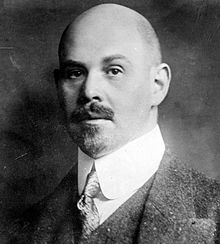Walther Rathenau
| Walther Rathenau | |
|---|---|
 |
|
| Foreign Minister of Germany | |
|
In office 1 February – 24 June 1922 |
|
| President | Friedrich Ebert |
| Chancellor | Joseph Wirth |
| Preceded by | Joseph Wirth (acting) |
| Succeeded by | Joseph Wirth (acting) |
| Personal details | |
| Born |
29 September 1867 Berlin, Kingdom of Prussia |
| Died | 24 June 1922 (aged 54) Berlin, Free State of Prussia |
| Political party | German Democratic Party |
| Relations | Emil Rathenau (father) |
| Profession | Industrialist, Politician, Writer |
Walther Rathenau (29 September 1867 – 24 June 1922) was a German statesman who served as Foreign Minister during the Weimar Republic.
Rathenau initiated the Treaty of Rapallo, which removed major obstacles to trading with Soviet Russia. Although Russia was already aiding Germany’s secret rearmament programme, right-wing nationalist groups branded Rathenau a revolutionary, when he was in fact a moderate liberal who openly condemned Soviet methods. They also resented his background as a successful Jewish businessman.
Two months after signing the treaty, he was assassinated in Berlin by the right-wing terrorist group Organization Consul. The public viewed Rathenau as a democratic martyr until the Nazis banned all commemorations of him.
Rathenau was born in Berlin. His parents were Emil Rathenau and Mathilde Nachmann. His father was a prominent Jewish businessman and founder of the Allgemeine Elektrizitäts-Gesellschaft, an electrical engineering company.
He studied physics, chemistry, and philosophy in Berlin and Strasbourg, and received a doctorate in physics in 1889 after studying under August Kundt. His German Jewish heritage and his assimilated wealth were both factors in establishing his deeply divisive reputation in German politics at a time of antisemitism among gentiles.
He summed up his feelings about growing up in Germany
I am a German of Jewish origin. My people are the German people, my home is German land, my belief is German belief, which stands above all denominations.
Reading Goethe, the greatest German poet was a national pride for the German. But more significant was the development of an independent-minded scientist and expert in "The Absorption of Light by Metals".
He worked as a technical engineer in a Swiss aluminium factory, and then as a manager in a small electro-chemical works in Bitterfelde where he conducted experiments in electrolysis. He returned to Berlin and joined the AEG board in 1899, becoming a leading industrialist in the late German Empire and early Weimar Republic periods. In 1903 his younger and much more entrepreneurial brother Erich Rathenau died. Broken-hearted his father had to be content with Walther's help instead. Walther Rathenau was a highly successful industrialist: in a decade he set up power stations in Manchester (England), Buenos Aires (Argentina), and Baku (northern Persia, later run by the Soviet Union). AEG acquired ownership of a streetcar company in Madrid; and in East Africa he purchased an English firm. In total he was involved with 84 companies worldwide. AEG was particularly celebrated for vertical integration methods and a strong emphasis on supply chain management. Rathenau developed an expertise in business restructuring, turning companies around. Superb organizational capabilities made his company very rich, but it also produced the standards for new chemical development, such as Acetone in Manchester. He made large profits from commercial lending on an industrial scale, which were reinvested in capital and assets.
...
Wikipedia
